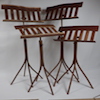I want to glue up some 3/4" alder to make wider boards. I've read about removing excess glue (squeeze) once it has become rubbery by scraping it off. But with a bar clamp every 10-12" how do you do this? Is it best to remove the bar clamps one at a time to scrape and wipe with a wet cloth, then replace the bar clamp and move to the next one? I see the advantage of removing the glue before it dries, for sure, but all this jostling of the workpiece must have an effect after carefully aligning pieces and even clamping gluing cauls to keep the piece nice and flat. My imagination is lacking on how to accomplish the goal. What is recommended? Thanks, in advance for any tips.






 Reply With Quote
Reply With Quote




